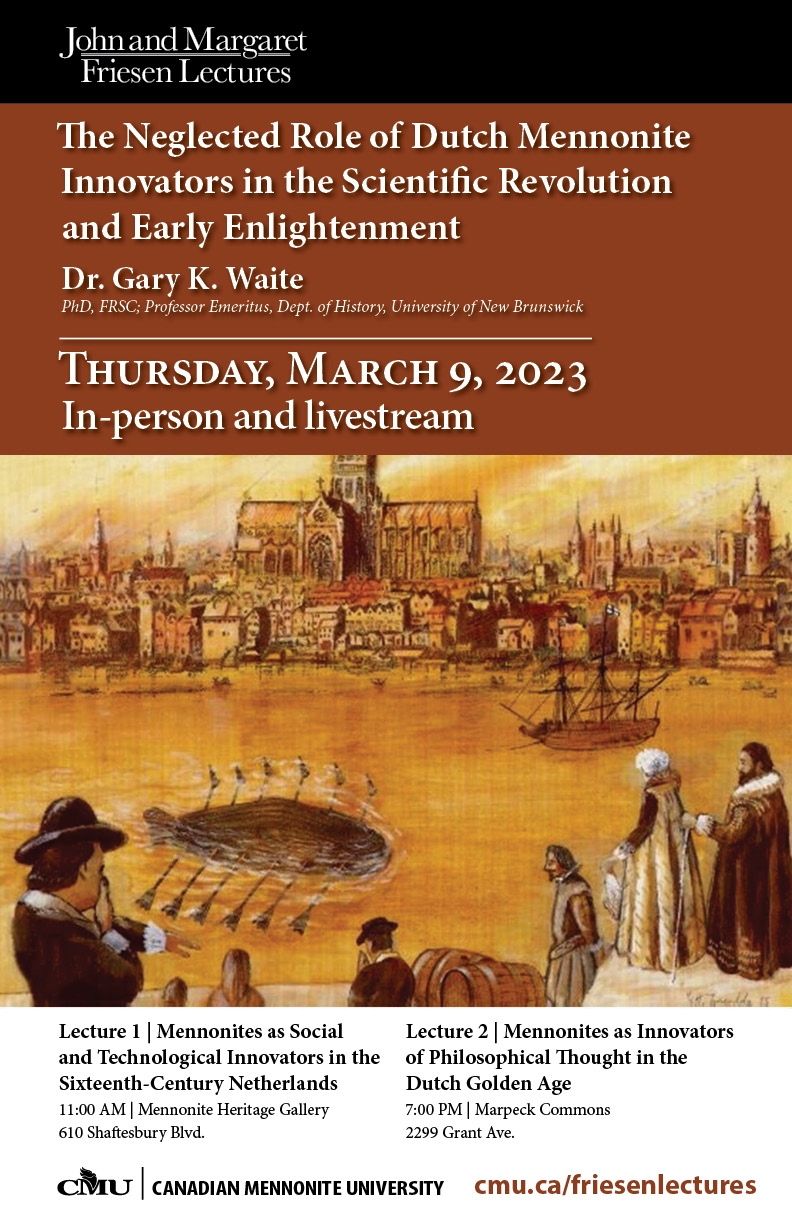News and Releases

Video
2023 John and Margaret Friesen Lectures with Dr. Dr. Gary K. Waite (videos)
The Neglected Role of Dutch Mennonite Innovators in the Scientific Revolution and Early Enlightenment
Friday, March 10, 2023 @ 9:57 AM | Video
These interconnected lectures foreground the neglected role played by Dutch Mennonites in the development of new ideas in theology, scripture interpretation, social and religious organization, the promotion of religious toleration, and in technology, science, and philosophy.
Lecture 1 | "Mennonites as Social and Technological Innovators in the Sixteenth-Century Netherlands"
March 9, 11:00 AM | MHC Gallery (610 Shaftesbury Blvd.)
"Mennonites as Social and Technological Innovators in the Sixteenth-Century Netherlands," traces these developments among Mennonite groups from the end of the apocalyptical Münsterite Anabaptist movement into the seventeenth century. As most Anabaptists turned away from their earlier eschatological expectations, they followed Menno Simons in establishing a godly community of the faithful focused on obedience to the gospels and separation from the world. Many also practised a form of spiritualism which privileged the inner spiritual experience over the literal reading of scripture and external rites and confessions. This latter approach dominated the Doopsgezinden, as seen in their two-Word hermeneutic giving precedence to the "Inner Word" or Spirit over the literal text. This approach provided greater flexibility in breaching tradition not only in theology, but also in medicine (many Doopsgezind preachers were medical practitioners), science, and technology, leading to significant innovations like Pieter Pietersz's new windmill technology or Cornelius Drebbel's invention of a working submarine that amazed England's King James I.
Lecture 2 | "Mennonites as Innovators of Philosophical Thought in the Dutch Golden Age"
March 9, 7:00 PM | Marpeck Commons (2299 Grant Ave.)
"Mennonites as Innovators of Philosophical Thought in the Dutch Golden Age," highlights examples of Mennonites contributing in significant ways to new philosophies, whether through their own writings or through their participation in the Collegiant meetings which pioneered a non-clerical, democratic form of worship and whose members discussed scripture and philosophy in innovative ways. We will focus on three thematic case studies: 1. Spirit and Reason, or how spiritualism and rationalism worked together in Doopsgezind and Collegiant circles to lay the groundwork for René Descartes's Cartesian philosophy as well as for Spinoza's Theological-Political Tractatus of 1670. 2. Ecclesiology and Liberty: how Collegiants and Mennonites contributed to arguments in favour of religious diversity and tolerance and to the development of practical forms of egalitarian organization leading into the Enlightenment. And 3. How Doopsgezinden carried the scepticism of the devil from the Spiritualist/Anabaptist David Joris through to the Enlightenment, publishing the region's major anti-witch-hunt treatises and profoundly shaped the thinking behind the Cartesian Reformed preacher Balthasar Bekker's The World Bewitched of the 1690s, which explicitly removed demons from the natural world. These are merely a few examples of the major ways in which Mennonites were actors, rather than mere spectators, in the intellectual discourse of their day.

The John and Margaret Friesen Lectures in Anabaptist/Mennonite Studies are co-sponsored by Canadian Mennonite University, the Mennonite Heritage Centre, and the Centre for Mennonite Brethren Studies. The inaugural lectures in November 2002 were delivered by Dr. Abraham Friesen (Professor of History, University of California, Santa Barbara), the generous donor who initiated the lecture series.
KEYWORDS: public lecture, lecture, Friesen Lectures, Gary K. Waite, video


 Print This Article
Print This Article